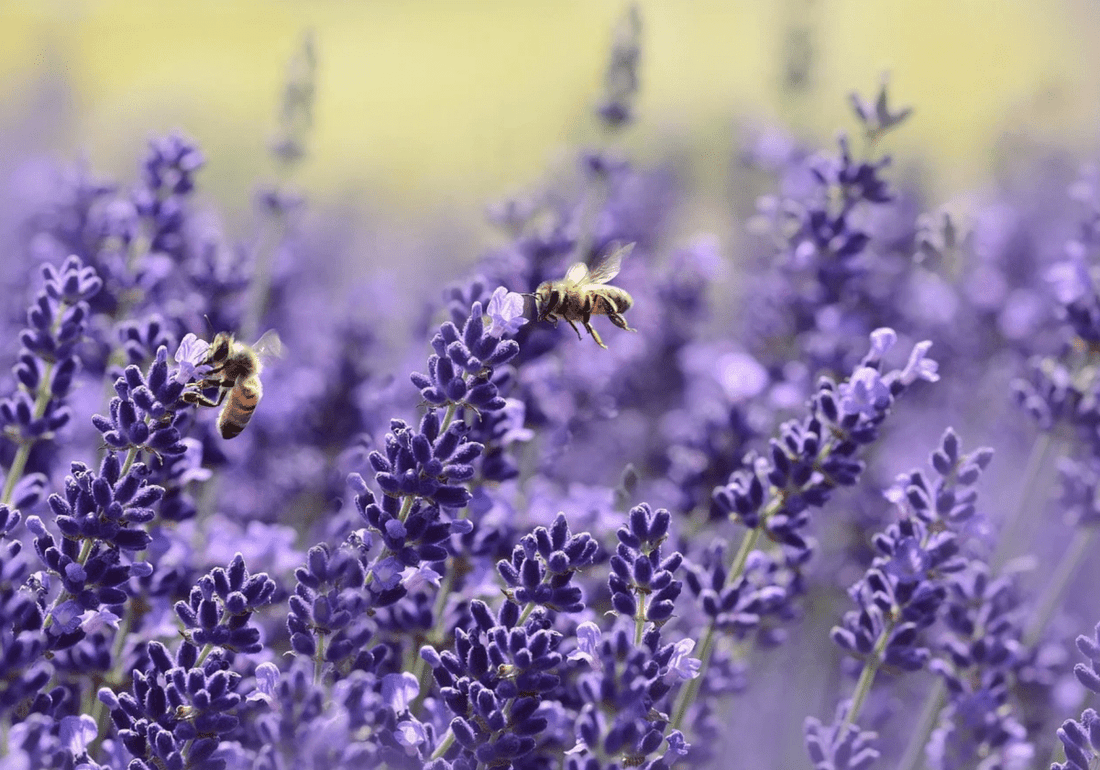Bees play a central role in our environment. Particularly in the summer months, large populations of bees can be observed buzzing through our meadows, forests and gardens. These insects are indispensable, not only for natural ecosystems, but also for human nutrition.
In one of our previous blogs, we reported on insect mortality and highlighted its fatal consequences for humans and nature. Among the species that suffer most from human intervention in the environment and from climate change are bees. Without bees, however, humans would be pretty much up a creek. That is why this blog is dedicated to the peaceful buzzing bees, which we must protect at all costs.
Bees: wild, tamed and interesting
Bees are a genus of insects that belong to the so-called hymenoptera. For us, bees are primarily honey bees. For thousands of years, humans have lived from the diligence of bee colonies, which were already kept in Pharaonic Egypt. But there is not only the honey bee called "apis mellifera". Around 30,000 different bee species are known, and many of them do not collect honey and live solitarily. Their performance as pollinators is nevertheless remarkable.
Honey bees are state-forming insects - a "colony" of up to 70,000 bees gathers around the queen, who is also the "mother of the nation". This is because each queen bee establishes her own colony after the nuptial flight, during which she stocks up on enough seeds from the male bees, the drones. The larvae that hatch from the eggs laid by the queen become workers, drones - or new queens - through varying nutritional quality.
Little power planes
The tiny insects are only a few millimetres in size, but can transport their own weight in pollen and map their surroundings through excellent vision, but also by leaving scent marks. Once a flower is harvested, there is no need to fly to it again. Bees are also incredibly efficient at communication. Through complex "dances", honey bees inform their conspecifics where to find rewarding "hunting grounds".
The amazing achievement of bees can be illustrated in a few facts:
- Global economic benefit of pollination services: approx. 270 billion US dollars
- Kilometres travelled for 1 litre of nectar or 500 g of honey: 120,000 km, three times the circumference of the earth.
- "Taskforce" for 55 g honey: around 20,000 bees
- Trips per bee per day: about 10x, with 0.05 g nectar harvest per flight
- Rest time: up to 8 hours daily
Why bees are not wasps
Among the thousands of bee species, there are relatively few that form colonies. The majority of wild bees live alone, some of them only join together to raise larvae, to hibernate or to fend off enemies. There are also great differences in diet. The honey bee and some other state-building bees build up food stores, while many wild bees live "hand to mouth".
The choice of food plants also varies - some species limit themselves to a single plant species. Honey bees, on the other hand, fly to whatever is in flower. Although they are sort-faithful, i.e. they first harvest the flowers of a plant before starting a new "project", they are not choosy.
The state-building "true" bees include bumblebees, while wasps and hornets are a separate subfamily of Hymenoptera. They are also state-building insects that build complex nests - they prefer nectar for food, but do not stop at other insects or even meat.
Threat of parasites and habitat loss
Beekeepers mean the loss of entire bee colonies when they talk about bee mortality - conservationists, however, refer more to the endangerment of the numerous wild bee species. The industrious flyers are threatened in many ways.
Infestation by the so-called Varroa mite is dangerous for them. However, it can spread mainly in the hives of "industrial" beekeepers. The highly bred "useful bees" cannot offer them much resistance. Old bee species prove to be much more resistant to the mite and are therefore increasingly being rediscovered.
More difficult for insects is the loss of habitats. They need flowering meadows and unspoiled natural landscapes where seasonal flowering plants thrive to survive, but nesting sites are also becoming scarce. Old walls or fallen tree trunks, often also holes in the ground, are gladly used especially by the solitary wild bees. A diverse landscape with "retreats" is what bees need. Prepared lawns or gravel-strewn front gardens deprive them of their habitat.
Added to this is the use of pesticides and herbicides, which kills entire bee colonies, unfortunately not only in large-scale agriculture, but also in private gardens. Quite a few beekeepers notice every summer when the flock of holiday home owners in the surrounding area starts gardening. That's when the bee colonies are in bad shape.
Simple contributions to bee conservation
Doing without chemicals in the balcony and garden already helps the bees a lot. It is even better to give them a corner in the garden - an overgrown spot where they do not mow and where wild flowers can thrive. Wood piles or even a "bee hotel" with holes drilled in it are also popular nesting sites.
Early-flowering plants are especially important for feeding wild bees and bumblebees. This is because the insects already fly out in the last days of winter and start looking for food.
By protecting the bees, we ensure our survival
Bee protection protects people. Because the small pollinators are one hundred percent responsible for the flourishing of important crops. What not everyone knows: pollination by bees also improves the yield performance of plants and the quality of fruit. In comparison with mechanical pollination, clear differences became visible. So the close symbiosis between plant and bee still holds many secrets.
At the same time, bees with their richness of species and diversity of life forms are of course a wonderful example of the fascinating world of insects. Despite their defensiveness, they are rarely really aggressive and enrich one's own garden as well as large-scale biotopes.
At NIKIN , we are primarily concerned with sustainable materials in the fashion industry and want to fight against global deforestation. But it is important to us to motivate people to rethink their lifestyle in other areas as well and possibly make it more sustainable.
The impressive film "More Than Honey shows how important bees are for biodiversity and our environment.
























